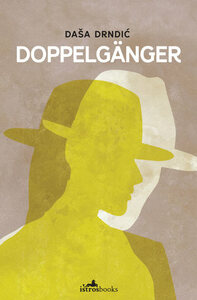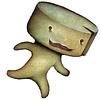Take a photo of a barcode or cover
dark
informative
reflective
sad
tense
medium-paced
Plot or Character Driven:
Character
Strong character development:
Complicated
Loveable characters:
No
Diverse cast of characters:
No
Flaws of characters a main focus:
Yes
mysterious
sad
fast-paced
Plot or Character Driven:
Character
Strong character development:
Yes
Loveable characters:
N/A
Diverse cast of characters:
N/A
Flaws of characters a main focus:
Yes
This is two novellas that seem independent until towards the end of the second novella when the tales do link. I loved ‘Artur and Isabella’, the first novella. Drndić’s writing is compelling. The second novella, ‘Pupi’, was extremely confusing. Printz (Pupi) was clearly having non-neuro-sensical moments and experiencing post-WWII hangover. All in all I think I may have missed some bigger meaning here but I know I feel sad and confused for all (except probably Herzog and his wife).
challenging
dark
emotional
sad
medium-paced
Plot or Character Driven:
Character
everyone who reads this book, read on the very first page, a graphic description of an old man who was shitting his diaper and decided to keep on reading.
First story I couldn't really emotionally engage with? Maybe I lacked some context? I do like some weird old people shit and I've got soft spot for old slavic farts AND i am comfortable with "toilet things" but perhaps I am too young and comfortable to respond to what I read. Experimental alphabet page was a little goofy even if I am pretty sure I knew what it was getting at?
Second story I was worried was going to be reliant on shock value (for a few reasons) but turned out to be a devastatingly sad little story. A unjust and helpless bizarre spiral. I definitely liked it more than the first. I liked it a lot, and I'd probably rate this book higher if it was just for the second story only.
The writing style seemed strange at first but it was clearly intentional and became invisible but still evocative beneath the conscious surface, it's rhythm exacerbating dread
First story I couldn't really emotionally engage with? Maybe I lacked some context? I do like some weird old people shit and I've got soft spot for old slavic farts AND i am comfortable with "toilet things" but perhaps I am too young and comfortable to respond to what I read. Experimental alphabet page was a little goofy even if I am pretty sure I knew what it was getting at?
Second story I was worried was going to be reliant on shock value (for a few reasons) but turned out to be a devastatingly sad little story. A unjust and helpless bizarre spiral. I definitely liked it more than the first. I liked it a lot, and I'd probably rate this book higher if it was just for the second story only.
The writing style seemed strange at first but it was clearly intentional and became invisible but still evocative beneath the conscious surface, it's rhythm exacerbating dread
sad
tense
medium-paced
dark
Loveable characters:
No
Kratko, jezgrovito, udara u žuč.
Način pisanja ne ostavlja mjesta za predah, sadrži mnogo riječi, pojmova, metafora, poveznica, likova dovedenih do groteske. Sam početak knjige činio mi se kao test izdržljivosti, koji se protegnuo do samog kraja. Prikaz neurodivergentnog uma efikasno me doveo u stanje polutransa, pogotovo kod nabrajanja. Neke scene su me dirnule i navele na propitivanje, no druge su me kroz ponavljanje dovele do tuposti.
Teško je pisati o ovoj knjizi, koja je teška, a opet, efikasno prikazuje jedno ljudsko iskustvo.
Način pisanja ne ostavlja mjesta za predah, sadrži mnogo riječi, pojmova, metafora, poveznica, likova dovedenih do groteske. Sam početak knjige činio mi se kao test izdržljivosti, koji se protegnuo do samog kraja. Prikaz neurodivergentnog uma efikasno me doveo u stanje polutransa, pogotovo kod nabrajanja. Neke scene su me dirnule i navele na propitivanje, no druge su me kroz ponavljanje dovele do tuposti.
Teško je pisati o ovoj knjizi, koja je teška, a opet, efikasno prikazuje jedno ljudsko iskustvo.
dark
mysterious
reflective
sad
medium-paced
Plot or Character Driven:
Character
Strong character development:
Complicated
Loveable characters:
Complicated
Diverse cast of characters:
Complicated
Flaws of characters a main focus:
Yes
I didn't really "enjoy" this book while reading it, but even months after finishing it, I find myself thinking about it a lot
It was certainly a perspective-expanding read
And perplexing
It was certainly a perspective-expanding read
And perplexing
Graphic: Excrement
Moderate: Suicide
dark
reflective
sad
slow-paced
Plot or Character Driven:
Character
Strong character development:
Yes
Loveable characters:
No
Diverse cast of characters:
No
Flaws of characters a main focus:
Complicated
I’m having a tough time rating this. It was wonderfully written, but I didn’t feel the connection between the first and second stories. I enjoyed the second more, but it was a crazy read as it follows a man in his decent into madness and homeliness. Both stories look at loneliness and isolation in communist and post-communist nations.
"If we were able to always free ourselves by weeping from the misery that overcomes us, obscure illnesses and poetry would disappear. But some innate refusal, intensified by upbringing, or some defect in the functioning of our tear glands, condemns us to the torment of dry eyes."
Rated: 4.25/5
I had come into this novel completely blind: no recommendations nor reviews read (or watched), guided only by the fact that it's published by New Directions [a new spin on judging a book by its cover, why not judge it by its publisher?!]. What I got out of it was a strange experience, frustratingly so, nothing quite like I've encountered so far, and something that I've yet to come to terms to.
"Doppelgänger", by Daša Drndić, is in two parts: "Artur and Isabel" (translated by S.D. Curtis) and "Pupi" (translated by Celia Hawkesworth)-set in Central Europe post-Holocaust, post-WW2, and post-Communism. At first glance, the two parts seem to have little-to-no connection with one another: the former occurs on the eve of a new millennium, a burst of passion that results in the fulfilment (and ending) of the eponymous characters' lives; the latter zig-zags across time, following the tragic-comic life of Printz/Pupi, who eventually dies trying to help his beloved rhinoceroses escape. Sure there's the single tie between Printz and Isabel, as Printz's family once possessed the silverware of Isabel's family (by chance? or some more insidious way?). However, what ties these two together is the theme of the "doppelgänger", the double.
The novel mourns the loss of potential; each protagonist is beset with confronting their double, their idealised self (consciously or sub-consciously formed) that was once a possibility had they been in different circumstances. Where else would these characters be but a better place if not for the wars and violence of the 20th century? Their narrative, their fate as decided by someone else. In the case of "Artur and Isabel": the actions of Nazi Germany, and the Croatian police. For "Pupi": Communist regimes, family and the narrator itself (it's a trippy effect to see Printz coming to terms of his identity after conforming to the narrator come the end of the novel). Or perhaps I'm just speaking out of my ass to spin a tale where there isn't supposed to be one; in a review of her work, Drndić reported to have stated contempt for stories in place of inducing psychological and somatic responses through words.
Regardless of whether my interpretation of the novel is sufficient, most likely not, I can say that I had greatly enjoyed the strange experience of "Doppelgänger". The translation is rendered to the author's wishes, sticking close to the effect one would get while reading it in the original Croatian. That is, to say, it's frustrating on purpose. I am intrigued to read more from her, perhaps her entire œuvre as I'm doing with Lispector.
Rated: 4.25/5
I had come into this novel completely blind: no recommendations nor reviews read (or watched), guided only by the fact that it's published by New Directions [a new spin on judging a book by its cover, why not judge it by its publisher?!]. What I got out of it was a strange experience, frustratingly so, nothing quite like I've encountered so far, and something that I've yet to come to terms to.
"Doppelgänger", by Daša Drndić, is in two parts: "Artur and Isabel" (translated by S.D. Curtis) and "Pupi" (translated by Celia Hawkesworth)-set in Central Europe post-Holocaust, post-WW2, and post-Communism. At first glance, the two parts seem to have little-to-no connection with one another: the former occurs on the eve of a new millennium, a burst of passion that results in the fulfilment (and ending) of the eponymous characters' lives; the latter zig-zags across time, following the tragic-comic life of Printz/Pupi, who eventually dies trying to help his beloved rhinoceroses escape. Sure there's the single tie between Printz and Isabel, as Printz's family once possessed the silverware of Isabel's family (by chance? or some more insidious way?). However, what ties these two together is the theme of the "doppelgänger", the double.
The novel mourns the loss of potential; each protagonist is beset with confronting their double, their idealised self (consciously or sub-consciously formed) that was once a possibility had they been in different circumstances. Where else would these characters be but a better place if not for the wars and violence of the 20th century? Their narrative, their fate as decided by someone else. In the case of "Artur and Isabel": the actions of Nazi Germany, and the Croatian police. For "Pupi": Communist regimes, family and the narrator itself (it's a trippy effect to see Printz coming to terms of his identity after conforming to the narrator come the end of the novel). Or perhaps I'm just speaking out of my ass to spin a tale where there isn't supposed to be one; in a review of her work, Drndić reported to have stated contempt for stories in place of inducing psychological and somatic responses through words.
Regardless of whether my interpretation of the novel is sufficient, most likely not, I can say that I had greatly enjoyed the strange experience of "Doppelgänger". The translation is rendered to the author's wishes, sticking close to the effect one would get while reading it in the original Croatian. That is, to say, it's frustrating on purpose. I am intrigued to read more from her, perhaps her entire œuvre as I'm doing with Lispector.



